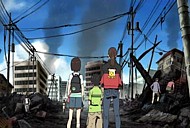
Tokyo Magnitude 8.0
Devastating. That's the word that comes to mind when I think of Tokyo Magnitude 8.0. On a surface level, you might expect devastation from a show with that name -- after all, it's obviously an earthquake reference. But Tokyo Magnitude 8.0 is not just about death and destruction. It is an emotional powerhouse that has haunted me for days. I have been moved by anime before, by titles like Grave of the Fireflies, Berserk, Macross, and Only Yesterday. Tokyo Magnitude 8.0 has just entered their ranks. While slight imperfections keep it from a perfect grade, it goes far beyond what I ever expected from a "disaster" show and reaches the upper echelons of the anime medium.
Mirai is a self-centered brat. Though not at all unusual, Mirai is a middle-schooler who feels put upon -- by her mom and dad who have to work all the time, by her younger brother Yuuki that she has to share a room with, by studies, by the world. She lives on her phone and wants to be left alone to do what she wants to do. Her self-absorption leads Yuuki, a smart and sweet boy, to jokingly (and lovingly) call her "the cell phone alien." You can bet how well that goes over.
As summer break begins, Mirai very reluctantly takes Yuuki across town to a robot exposition he's been waiting to see. Annoyed that she's spending the first day of her break playing babysitter to an eight-year-old, she can't wait for the day to be over. Texting a friend as Yuuki goes back into the mall to use the restroom and get a drink, Mirai snottily writes her wish that everything would go away and fall apart.
And suddenly, it all does.
As an 8.0 earthquake rips through the center of Tokyo, skyscraper windows shatter and bridges buckle under the strain. Alarms scream as a peaceful day downtown suddenly becomes a doomsday scenario. Mirai has no idea what to do, but she knows she has to go back in to find Yuuki, even if it's dangerous. She might be callous, but she's not leaving without her brother.
Before the next seventy-two hours are through, Mirai will find just how easy her life was. As she and Yuuki attempt to get home -- if there's a home to get back to -- they're befriended by a young mom, the motorcycle delivery gal Mari, who takes them under her wing. Together, the three of them face a city that resembles a war zone. Where once the only thing on Mirai's mind was spending time amusing herself, now she realizes that everything genuinely good in her life may disappear in an instant.
While Tokyo Magnitude 8.0 has good OP/ED songs and decent artwork, the show's appeal doesn't lie in those things. Nor does it excel at showing the destruction of Japan's central city in grand detail. Those who want the gorgeous demolition of Tokyo can find that in plenty of other anime. The character artwork is fine, but it won't please everybody either; those paying attention might notice that our leads' noses are all but absent a fair amount of the time. I don't say these things to rag on 8.0. I enjoyed its presentation thoroughly. However, I'd rather you go in prepared for a show whose strengths are not primarily in its technical aspects.
Rather than wow with technical prowess -- which is still evident, mind you -- Tokyo Magnitude 8.0 presents us with a journey through the hell of a major earthquake that is extremely believable. 8.0 captures the sheer helplessness of a disaster spinning totally out of control. It is traumatic, and if you've ever been through a major trauma, the realism may be a little too intense. After the first four episodes, I wasn't totally sure I could make it through the rest...not because of gore or violence but that feeling of impotence in the face of unthinkable disaster, which I've experienced before in real life. (It does settle down a bit from there.)
There are pluses and minuses to having children as the leads. As a parent, this is my worst nightmare. Those who aren't yet parents might not be drawn in as quickly as I was. This might be seen as an easy, even cheap way to build rapport with the audience. Yet if that were the case, creator and screenwriter Natsuko Takahashi wouldn't have had to have made Mirai such an unlikable character at first. It takes a fair amount of time before we become sympathetic to her...about the same time that it takes for her to get out of her selfish shell. Yet that choice adds to the realism of the whole.
8.0 could have made the two children lovable and helpless, but they aren't. Instead, they are both flawed, prone to do irrational things because they don't yet have enough life experience to recognize every danger as it comes at them. Yet for the occasional stupid move, they are also resourceful and intelligent. While their growing optimism is naïve, it's not out of place or out of character. And while we might think two preteens on their own in the big city is a plot contrivance, anyone aware of Tokyo's excellent public transit, lack of serious crime, and police known for helping lost travelers know that this is not a far-fetched scenario.
The story is captivating because of the disaster, but because the show is so focused on the children and their makeshift guardian, we quickly become enamored with them. When I was watching a few of the final episodes, my wife found herself sucked in; as she is not an anime fan, that's a rarity. Even when Tokyo isn't falling apart, it's compelling stuff. We want our new friends to be safe; we want them to find their homes and families secure and intact; we pray that things will not go from bad to worse. And yet, we know that in a realistic show like this, there is going to be great joy and great tragedy.
The one complaint I've heard consistently about Tokyo Magnitude 8.0 is that the pacing flags. I understand the concern, but I disagree. The earthquake happens as the first episode ends. While there are aftershocks and consequences that appear later, the intensity level cannot stay at that bellwether point. 8.0 wisely keeps from ramping up the tension; once we've gotten through episode four, we've seen the worst of the direct calamity (though not the human drama). I needed to catch my breath, honestly. We are so used to stories firing on all cylinders in the final act that a change from that traditional structure might be confusing, even frustrating, to some, but I appreciated it.
In fact, the one thing that makes my grade slip from perfect to near-perfect is the show's reliance on crumbling structures to add dramatic tension in the later half of the show. It seems that no building falls apart three miles away; no, every collapse must happen within feet of our protagonists. There's no doubt that a couple days after an earthquake, some edifices that survived the initial event finally give way. But it smacks of artifice for our small band to deal with the same thing happening multiple times. I admit that I'm at a loss to say what they should have done instead. In retrospect, the tragedy of the 2011 Tohoku earthquake has shown just what a threat tsunami pose in an earthquake, and that could have made the latter half of 8.0 stronger, but one can't fault the filmmakers for not predicting the future. It's a small thing that shouldn't affect a decision to see the show.
From earlier viewers, I heard that I should expect Tokyo Magnitude 8.0 to be excellent. It was. What I didn't expect was what a harrowing emotional experience it turned out to be. While younger viewers might find it more fascinating than scary, I'm not sure I've seen any anime I would consider to be more truly horrific. My stomach has been in knots remembering it as I wrote this review. Does that mean you should skip it? Absolutely not. It's a worthy exploration of the human condition in circumstances beyond our control. It made me hold my loved ones a little bit closer. It made me think about life's bigger issues beyond the day-to-day. Very few anime can do that. If you're up for it, Tokyo Magnitude 8.0 might shake up your world for the better.
Tokyo Magnitude 8.0 -- realistic death and destruction, mature themes, not recommended for children -- A

